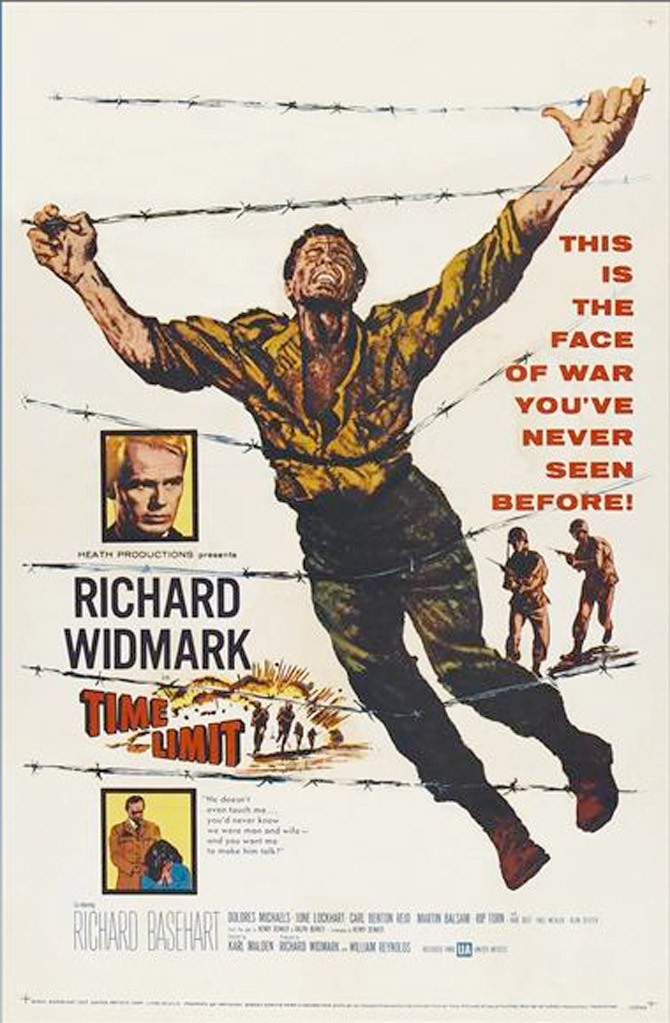
Time Limit (1957)
Time Limit is a 1957 legal drama film directed by Karl Malden, based on the Broadway play of the same name written by Henry Denker and Ralph Berkey. The film is Malden’s only directing credit; in his autobiography, Malden stated that he “preferred being a good actor to being a fairly good director.”
Director – Karl Malden
Writers – Henry Denker (screenplay), Ralph Berkey (play)
Cast –
Richard Widmark as Colonel William Edwards
Richard Basehart as Major Harry Cargill
Dolores Michaels as Corporal Jean Evans
June Lockhart as Mrs. Cargill
Carl Benton Reid as General Connors
Martin Balsam as Sergeant First Class Baker
Rip Torn as Lieutenant George Miller
Khigh Dhiegh as Colonel Kim (as Kaie Deei)
Yale Wexler as Captain Joe Connors
Alan Dexter as Mike
Manning Ross as Lieutenant Harvey
Joe Di Reda as Gus (as Joe Di Rida)
James Douglas as Steve
Kenneth Alton as Boxer
Jack Webster as Lieutenant Harper
Watch “Time Limit” (1957)
Plot
Army Colonel William Edwards (Richard Widmark) is investigating the case of Major Harry Cargill (Richard Basehart), accused of collaborating with the enemy while he and his unit were held captive in a North Korean prisoner of war camp. Cargill willingly admits his guilt and brings forth evidence that proves that he signed a germ-warfare confession and broadcast anti-American speeches over the radio, seemingly an act of treason.
It seems to be an open-and-shut case, were it not for Cargill’s inexplicable refusal to defend himself. Arousing further suspicion is the fact that his collaboration immediately followed the deaths of two of his soldiers, and the unit’s survivors all recite an identical, rehearsed account of those deaths. Edwards’ commander, General Connors (Carl Benton Reid), has a strong personal interest—his son, Captain Joe Connors (Yale Wexler), was one of those who died—and presses Edwards to recommend a court-martial, but Edwards delves into the mystery, refusing to accept the facile explanations.
In the end, the shocking truth comes out. Lieutenant George Miller (Rip Torn) reveals that, after Lieutenant Harvey (Manning Ross) was killed trying to escape, the rest of the men discovered that, under torture, Captain Connors had betrayed him. Over Cargill’s strong objections, they decided to execute Connors. Drawing the short straw, Miller strangled him. Subsequently, their captor, Colonel Kim (Khigh Dhiegh), gave Cargill an ultimatum: give in, or all his men would be executed. He agreed to collaborate to save their lives.
General Connors calls his son a traitor. Cargill argues with him, stating that there must be a time limit on being a hero. He denounces the Uniform Code of Military Justice espoused by General Connors for demanding too much from soldiers, but the general reminds him that, while Cargill anguished over the lives and families of 16 men, many commanders had to anguish over the effect of their orders on the lives and families of thousands.
Edwards agrees with General Connors that although Cargill acted out of a humane selflessness, Cargill’s judgment was flawed. He recommends that all charges be dropped, but warns Cargill that there will be a court-martial. Edwards himself will defend Cargill. Maybe they won’t come up with all the answers, Edwards tells him, but “they’ll know we asked the questions.”